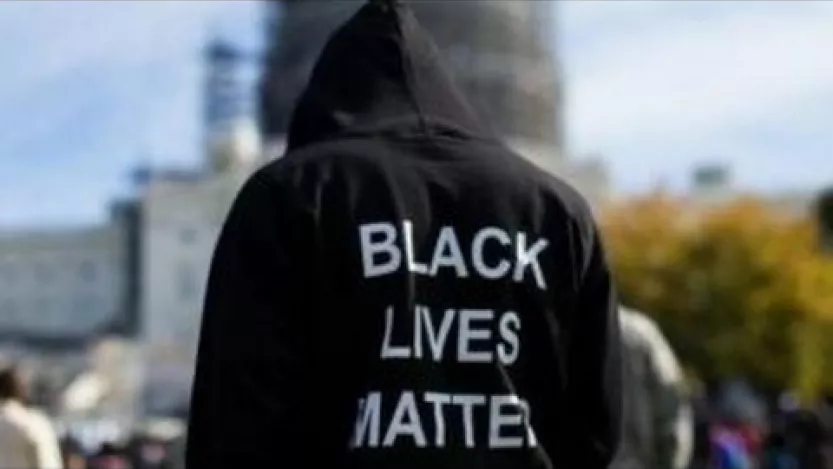Table of Contents
Essex County College wrongly fires professor over controversial TV spot

A recent nationwide outbreak of faculty censorship has left adjunct faculty members — who lack the formal protections of tenure — particularly vulnerable when publicly expressing their views on contemporary political issues.
In a particularly notable instance, Newark, New Jersey’s Essex County College has been embroiled since early June in a controversy over its treatment of Lisa Durden, a political commentator and adjunct professor in the English department.
On June 6, Durden appeared as a guest on a segment of “Tucker Carlson Tonight” on Fox News. Durden appeared on the segment in her personal capacity as a political commentator. She did not identify herself as a faculty member at ECC, nor claim to speak for ECC, nor did Fox News identify her relationship with ECC.
During the segment (below), Carlson asked Durden for her opinion on a Black Lives Matter Memorial Day event in Brooklyn, New York, which was limited by the organizers to black individuals. Durden defended the event, denying that it was racist and explaining that its exclusivity was a result of pervasive historical discrimination against black people.

When she arrived on ECC’s campus to teach her class on June 8, Durden was intercepted by a member of the ECC administration and told that she had been suspended until further notice. She was instructed to cancel classes and turn over her grade book to the chairman of the humanities division.
When Durden asked for an explanation for her suspension, ECC Vice President for Academic Affairs Jeffrey Lee and Assistant Director of Human Resources Karen Bridgett informed her that ECC had fielded complaints about her appearance on television, which included the false allegation that she associated herself with ECC during the segment. Lee and Bridgett told Durden that she would remain suspended while ECC investigated the complaints.
It should not have taken administrators very long to watch the roughly six-minute interview and determine that Durden’s affiliation with ECC was never mentioned. But two weeks later, ECC President Anthony Munroe issued a startling statement in which he revealed that Durden would not be reinstated, and that ECC was cancelling her appointment for the fall semester to teach “Mass Communications and Popular Culture” and “Effective Speech.” Munroe’s statement noted that both current and prospective students and faculty members had inundated the college with feedback “expressing frustration, concern and even fear that the views expressed by a College employee (with influence over students) would negatively impact their experience on the campus.”
Of course, Munroe’s statement also paid the tribute to freedom of expression and academic freedom customary before one, in the same breath, violates those principles wholesale:
- To continue to effectively fulfill our mission and to continue our legacy of providing opportunity and success, there are principles, which we eagerly embrace. First, Essex County College deeply values free speech and academic freedom. The open exchange of ideas and perspectives gives strength to our institution and provides depth to the education provided to our students.
- The College also supports and affirms the right of free speech and independent views and expressions of those views for our faculty and staff. We expect and encourage faculty involvement in our community. My administration has a duty to set a strong example of tolerance. Accordingly, free speech and academic freedom must always work in the service of our student body.
Buried at the bottom of the statement, along with the conclusion that ECC had resolved to cut ties with Durden due to “the impact this matter has had on the College’s fulfillment of its mission,” was an express admission that Durden was speaking only for herself:
While the adjunct who expressed her personal views in a very public setting was in no way claiming to represent the views and beliefs of the College, and does not represent the College, her employment with us and potential impact on students required our immediate review into what seemed to have become a very contentious and divisive issue. . . . In consideration of the College’s mission, and the impact that this matter has had on the College’s fulfillment of its mission, we cannot maintain an employment relationship with the adjunct.
While that fact may be buried at the bottom of Munroe’s statement, it is important to address it first because it casts significant doubt over ECC’s own actions. This is hardly the first time that a government employee has gotten into trouble for making public statements. In fact, there’s a long line of case law going back decades upon decades establishing what rights public employees retain.
In a nutshell: The law is well-established that employees of government institutions like ECC retain a First Amendment right to speak as private citizens on matters of public concern and may not be disciplined or retaliated against for their constitutionally protected expression unless the government employer demonstrates that the expression hindered “the effective and efficient fulfillment of its responsibilities to the public.” Connick v. Myers, 461 U.S. 138, 150 (1983); Pickering v. Bd. of Ed., 391 U.S. 563 (1968).
In the higher education context, courts have repeatedly held that the non-renewal of an untenured faculty member’s contract on the basis of constitutionally protected expression constitutes impermissible retaliation. Perry v. Sindermann, 408 U.S. 593, 598 (1972) (“[T]his Court has specifically held that the nonrenewal of a nontenured public school teacher’s one-year contract may not be predicated on his exercise of First and Fourteenth Amendment rights . . . . We reaffirm those holdings here.”) (internal citations omitted); Hardy v. Jefferson Cmty. College, 260 F.3d 671 (6th Cir. 2001) (holding that an untenured professor’s in-class speech constituted expression on a matter of public concern, and that the college’s non-renewal of his appointment violated the First Amendment); Lewis v. Spencer, 468 F.2d 553 (5th Cir. 1972) (holding that “lack of tenure is immaterial” to a First Amendment retaliation claim when a contract is not renewed); Kahan v. Slippery Rock Univ. of Pennsylvania, 50 F. Supp. 3d 667, 687 (W.D. Pa. 2014), aff’d 664 F. App’x 170 (3d Cir. 2016) (“There can be no reasonable dispute that the non-renewal of [Plaintiff]’s one-year, probationary contract qualifies as an adverse employment action.”).
It is indisputable that Durden’s speech is protected by the First Amendment, and indeed constitutes precisely the type of speech that the First Amendment was intended to protect. Durden spoke as a private citizen and was introduced only as a “political commentator,” and as noted, Munroe’s statement even acknowledges that she “was in no way claiming to represent the views and beliefs of the College.” Durden’s expression was also squarely related to a matter of public concern, as evidenced by its coverage on a national news program. She opined on a contemporary political and social movement and its tactics, a matter of significant public debate around the country.
Munroe’s June 23 statement alleges that ECC’s decision to suspend Lisa Durden, and ultimately cancel her appointment for the fall semester, rests on “the impact that this matter has had on the College’s fulfillment of its mission.” But each purported justification set forth in his statement fails to overcome Durden’s First Amendment rights.
First, the statement insinuates that Durden’s expression created an environment that is unwelcoming to some students and implied in some way “that all students are not welcome to participate in, or benefit from, our programs or activities on the basis of their race, color, orientation or national origin.” This assertion has no basis in fact. Foremost, Durden appeared on Tucker Carlson’s show not to discuss any campus issues, but rather an event miles away, in an entirely different city and state. Moreover, even in explaining the rationale of Black Lives Matters in restricting attendance at their event, Durden expressly stated that she might not have made the same decision that they did, and that she was simply respecting and defending their position. Durden did not endorse or encourage similar activities at ECC, or anywhere else. Nor is there any indication that Durden has engaged in any form of discrimination against her students, or that her students will ever risk being treated differently based on their race.
Second, Munroe’s statement cites an “outpouring of concern” for the student body in an attempt to justify ECC’s treatment of Durden. But if simply offending others and causing an “outpouring” of criticism and consternation were sufficient to overcome a faculty member’s First Amendment rights, freedom of expression on campus would be reduced to a nullity.
The principle of freedom of speech does not exist to protect only non-controversial expression; it exists precisely to protect speech that some or even most members of a community may find controversial or offensive. The Supreme Court has explicitly held, in rulings spanning decades, that speech cannot be restricted simply because it offends people. See, e.g., Papish v. Board of Curators of the University of Missouri, 410 U.S. 667, 670 (1973) (“[T]he mere dissemination of ideas—no matter how offensive to good taste—on a state university campus may not be shut off in the name alone of ‘conventions of decency.’”). The freedom to offend some listeners is the same freedom to move or excite others. As the Supreme Court observed in Terminiello v. Chicago, 337 U.S. 1, 4 (1949), speech “may indeed best serve its high purpose when it induces a condition of unrest . . . or even stirs people to anger. Speech is often provocative and challenging. It may strike at prejudices and preconceptions and have profound unsettling effects as it presses for acceptance of an idea.” The Court reiterated this fundamental principle in Snyder v. Phelps, 562 U.S. 443, 461 (2011), proclaiming that “[a]s a Nation we have chosen . . . to protect even hurtful speech on public issues to ensure that we do not stifle public debate.”
Accordingly, courts have rejected the argument that a college can discipline or refuse to renew the contract of a faculty member because their expression caused anger, alarm, or concern. Rejecting a college’s argument that intervention by a local civil rights activist after an adjunct instructor used gendered and racial slurs as part of a classroom discussion posed an actionable risk of disruption to the school’s operations, the U.S. Court of Appeals for the Sixth Circuit adhered to the principles set forth in Terminiello and wrote:
Only after Reverend Coleman voiced his opposition to the classroom discussion did Green and Besser become interested in the subject matter of Hardy’s lecture. Just like the school officials in Tinker, Green and Besser were concerned with “avoiding the discomfort and unpleasantness that always accompany” a controversial subject. On balance, Hardy’s rights to free speech and academic freedom outweigh the College’s interest in limiting that speech.
Hardy, 260 F.3d at 682 (internal citation omitted).
There have been no allegations of any misconduct committed by Durden, nor of any actual disruption to ECC’s operations. Moreover, there is no credible argument that her ability to perform her job duties is affected by her appearance on television. Rather, as in Hardy, ECC has — by its own admission — responded to public criticism and concern by punishing Lisa Durden because others voiced opposition to her expression. This is a result that the First Amendment plainly forbids.
And what about those laudatory statements about freedom of expression and academic freedom and their importance to the academic enterprise? Given the surrounding context, it is difficult to see those commitments as anything other than mere lip service.
ECC’s message to its faculty is chillingly clear: If faculty members voice their views and cause offense to others, they will be investigated and disciplined. The guarantee of freedom of expression is not without cost. Some may decide that they do not wish to associate with a college that employs a professor with views they find offensive, rude, or in error. But this is the cost of credibly operating a university which values the ability to express and confront challenging views. When a speaker exercises the rights afforded to her, particularly as a private citizen, a subsequent attempt on the college’s part to penalize her — by sanction or by subjecting her to an investigation — comes at the expense of the college’s credibility and commitment to its central mission.
ECC’s treatment of Lisa Durden is antithetical to the freedom that the institution purports to embrace: the right to express views on issues central to our national conversation in ways that might be provocative or disagreeable. Such responses will be counterproductive, serving only to reward complaints to ECC administrators about the political speech of any faculty member or student, as complainants become confident that administrators will subject their adversary to punishment by process. Behavior that is rewarded will be repeated, to ECC’s detriment.
Contrary to Munroe’s insinuation that Durden’s exercise of her expressive rights did not “work in the service of [ECC’s] student body,” it is ECC’s brazen violation of those rights — in the face of clearly established law — that does the largest disservice to the entire campus community.
Recent Articles
FIRE’s award-winning Newsdesk covers the free speech news you need to stay informed.

VICTORY! Charges dropped against TN woman cited for using skeletons in Christmas decorations

Maine’s censure of lawmaker for post about trans student-athlete is an attack on free speech

Trump’s border czar is wrong about AOC
